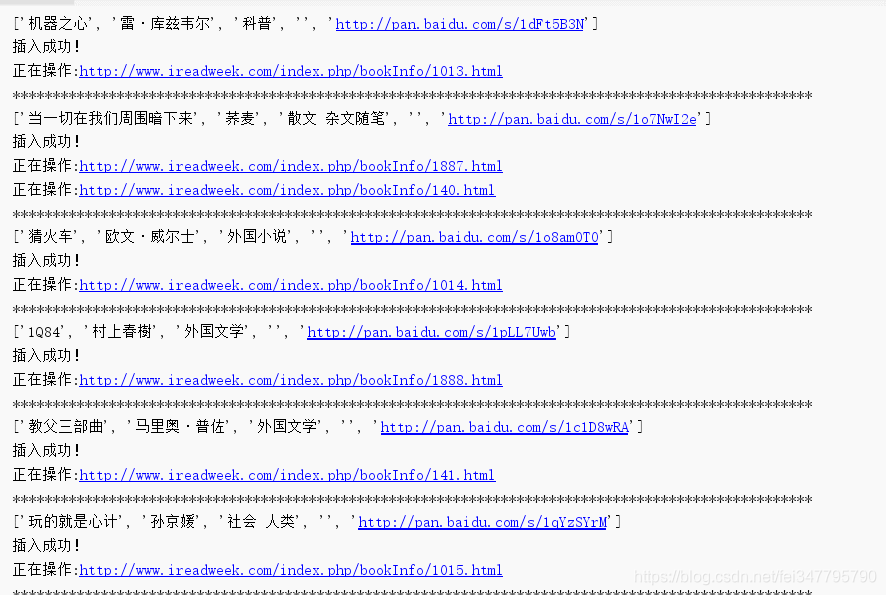行行网电子书多线程爬取-撸代码
代码非常简单,有咱们前面的教程做铺垫,很少的代码就可以实现完整的功能了,最后把采集到的内容写到 csv 文件里面,(csv 是啥,你百度一下就知道了) 这段代码是IO密集操作 我们采用aiohttp模块编写。
第1步
拼接URL,开启线程。
import requests
# 导入协程模块
import asyncio
import aiohttp
'''
遇到不懂的问题?Python学习交流群:821460695满足你的需求,资料都已经上传群文件,可以自行下载!
'''
headers = {"User-Agent": "Mozilla/5.0 (Windows NT 10.0; WOW64) AppleWebKit/537.36 (KHTML, like Gecko) Chrome/68.0.3440.106 Safari/537.36",
"Host": "www.ireadweek.com",
"Accept": "text/html,application/xhtml+xml,application/xml;q=0.9,image/webp,image/apng,*/*;q=0.8"}
async def get_content(url):
print("正在操作:{}".format(url))
# 创建一个session 去获取数据
async with aiohttp.ClientSession() as session:
async with session.get(url,headers=headers,timeout=3) as res:
if res.status == 200:
source = await res.text() # 等待获取文本
print(source)
if __name__ == '__main__':
url_format = "http://www.ireadweek.com/index.php/bookInfo/{}.html"
full_urllist = [url_format.format(i) for i in range(1,11394)] # 11394
loop = asyncio.get_event_loop()
tasks = [get_content(url) for url in full_urllist]
results = loop.run_until_complete(asyncio.wait(tasks))
上面的代码可以同步开启N多个线程,但是这样子很容易造成别人的服务器瘫痪,所以,我们必须要限制一下并发次数,下面的代码,你自己尝试放到指定的位置吧。
sema = asyncio.Semaphore(5)
# 为避免爬虫一次性请求次数太多,控制一下
async def x_get_source(url):
with(await sema):
await get_content(url)
第2步
处理抓取到的网页源码,提取我们想要的元素,我新增了一个方法,采用lxml进行数据提取。
def async_content(tree):
title = tree.xpath("//div[@class='hanghang-za-title']")[0].text
# 如果页面没有信息,直接返回即可
if title == '':
return
else:
try:
description = tree.xpath("//div[@class='hanghang-shu-content-font']")
author = description[0].xpath("p[1]/text()")[0].replace("作者:","") if description[0].xpath("p[1]/text()")[0] is not None else None
cate = description[0].xpath("p[2]/text()")[0].replace("分类:","") if description[0].xpath("p[2]/text()")[0] is not None else None
douban = description[0].xpath("p[3]/text()")[0].replace("豆瓣评分:","") if description[0].xpath("p[3]/text()")[0] is not None else None
# 这部分内容不明确,不做记录
#des = description[0].xpath("p[5]/text()")[0] if description[0].xpath("p[5]/text()")[0] is not None else None
download = tree.xpath("//a[@class='downloads']")
except Exception as e:
print(title)
return
ls = [
title,author,cate,douban,download[0].get('href')
]
return ls
第3步
数据格式化之后,保存到csv文件,收工!
print(data)
with open('hang.csv', 'a+', encoding='utf-8') as fw:
writer = csv.writer(fw)
writer.writerow(data)
print("插入成功!")
行行网电子书多线程爬取-运行代码,查看结果
